The Rise of the Management Consultant
- Home
- Articles
- Insights & trends
- The Rise of the Management Consultant
The surprising trend of declining CEOs
Over the past 10 years, the number of Management Consultants in Australia (also known as Business Advisors and referred to as Management and Organisation Analysts by the ABS) has grown by 63.18%; 4-fold higher than the growth rate of total workers.
Coinciding with this trend is the surprising decline of the number of Chief Executives and Managing Directors in Australia. Over the same period, the profession has seen a decline of 6.77% or 4,155 employees; despite the total number of businesses in Australia growing by 12.65%.
The Australian National Skills Commission (ANSC) has forecast this trend will continue; with Management and Organisation Consultants growing at an annualised rate of 2.98% over the next 5 years and CEOs declining at an annual rate of 1.52%.
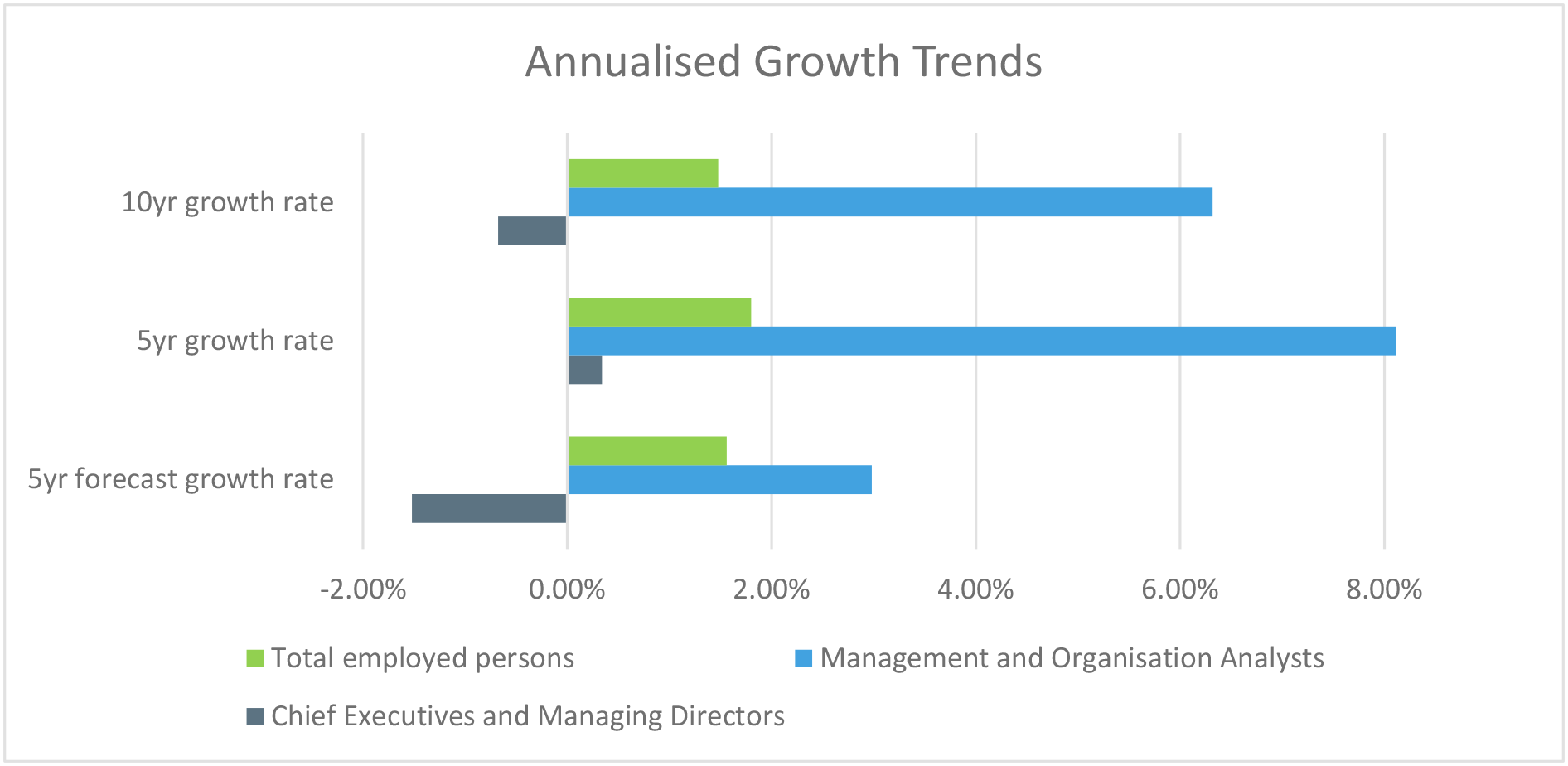
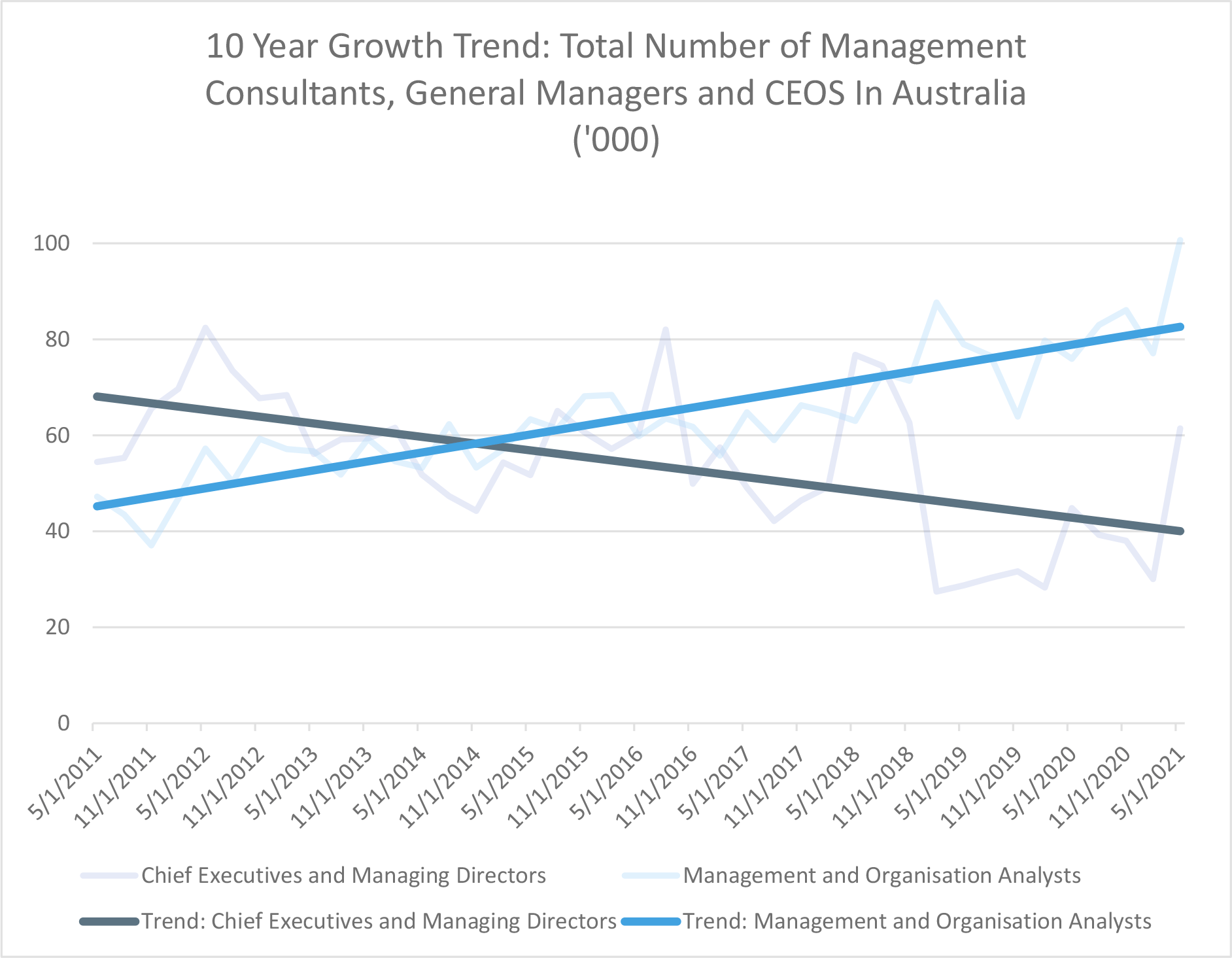
Combined, the increase in management consultants has largely reflected the decline in traditional CEOs/Managing Directors. And, when added together, there has only been a 3.67% growth over the past 10 years.
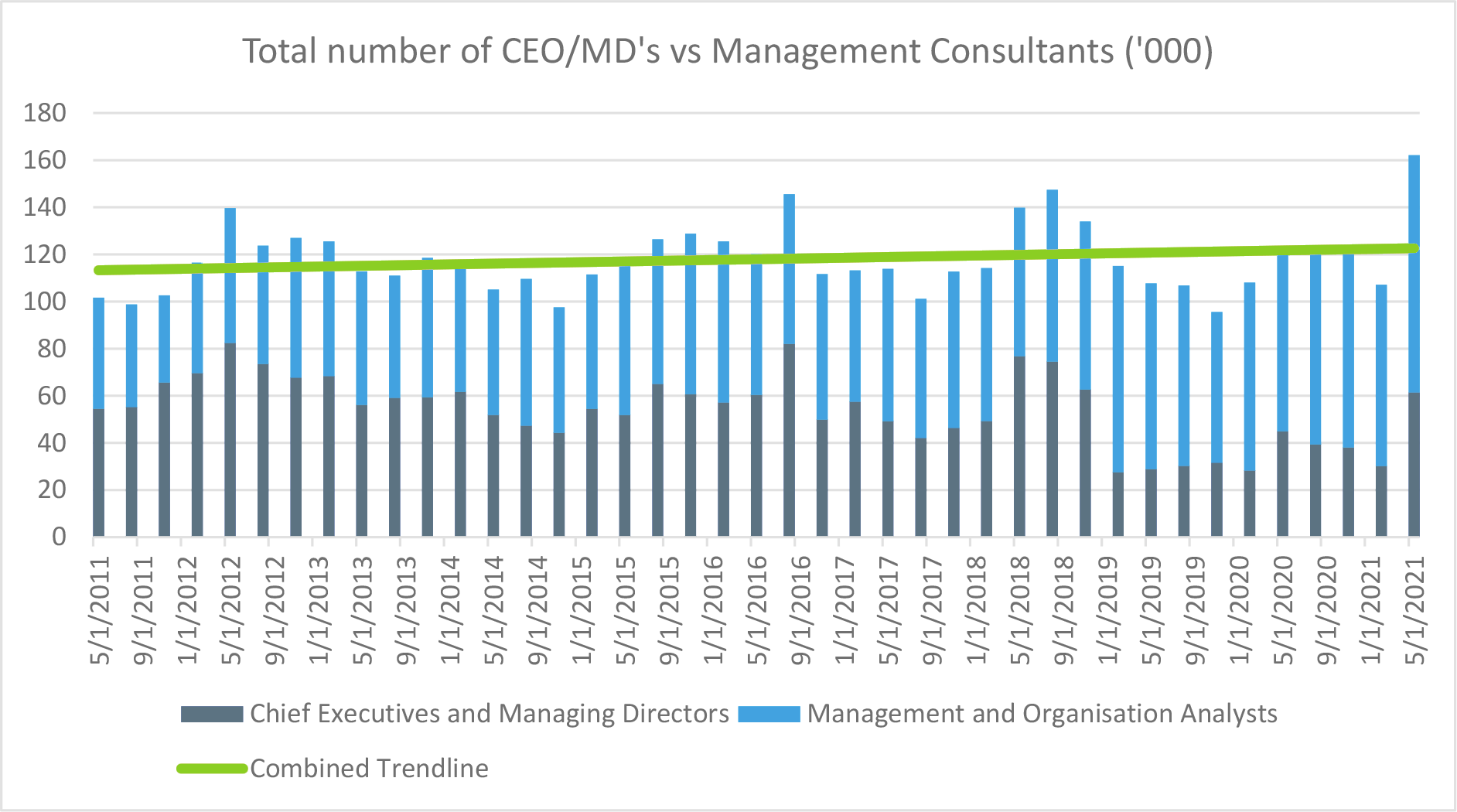
So where have all the CEOs gone?
What is a ‘Management and Organisation Analyst’?
The Australian Bureau of Statistics (ABS) ANZSCO defines a Management and Organisation Analyst as someone who: assist organisations to achieve greater efficiency and solve organisational problems, and study organisational structures, methods, systems and procedures.
Jobs within this classification include Business Consultants and Procedures Analysts and the Government’s Jobs Outlook website clarifies them as Management Consultants and Organisation Methods Analysts.
Where have all the CEOs gone?
The CEO or Managing Director has long been a prestigious position. Traditionally, hardworking employees would aspire to rise up the ranks in the hope of scoring the ‘top job’. The role would require an in-depth knowledge of business, finance, industry, and leadership.
Yet according to recent data from Jobs Australia and the ABS, it’s clear todays CEOs are increasingly industry/job specialists and not business specialists.
The 2016 Census in Australia[i] showed that:
“Only 5.2 % of all owner managers in Australia had their highest (non-school) qualification in Business and Management. Even fewer nominated the fields of Accounting (3.4%), Sales and Marketing (1.8%), Banking, Finance and Related fields (1.4%) or Other Management and Commerce (0.2%).” – ABS 2016 Census report
To support this, the latest Jobs Australia data shows the largest growth of business owners (determined by both size and percentage growth from 2010-2018) came from Industry specialists such as Health Professionals, Hospitality Managers/Workers and Specialist Managers.
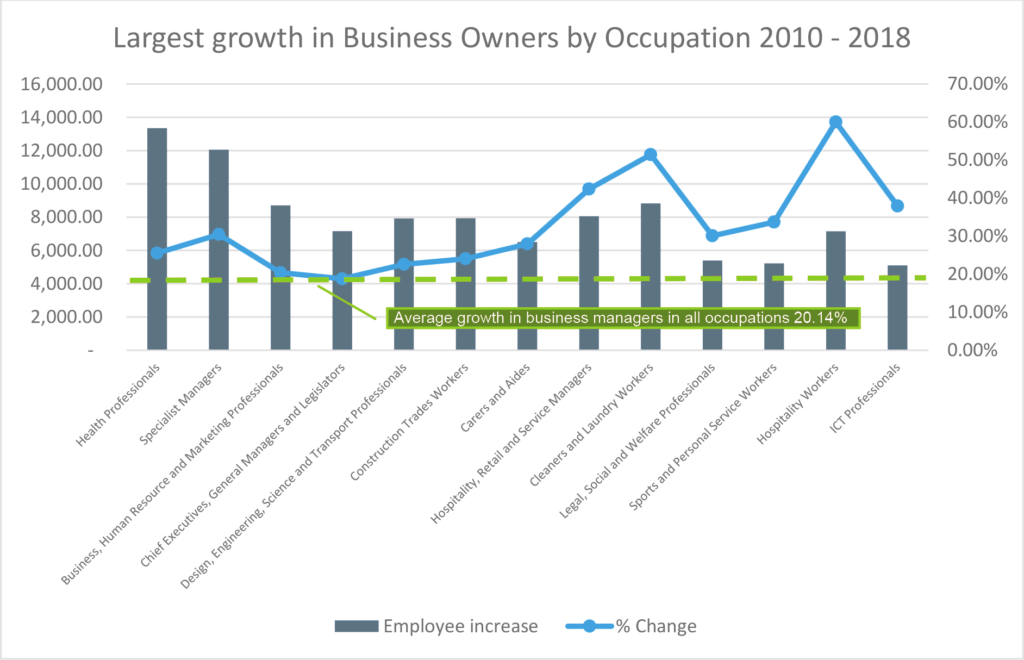
Whilst there was still an increase in the larger group of CEOs, General Managers and Legislators over this period, it was the only Job Group in the top 15 to show a decline in the percentage of total employees over the period. In other terms, in 2011, 4.58% of all business owners were CEOs, General Managers or Legislators. By 2018, this figure had declined by 1.1%. In comparison, every other ‘top 15 business owner occupation’ had increased its share.
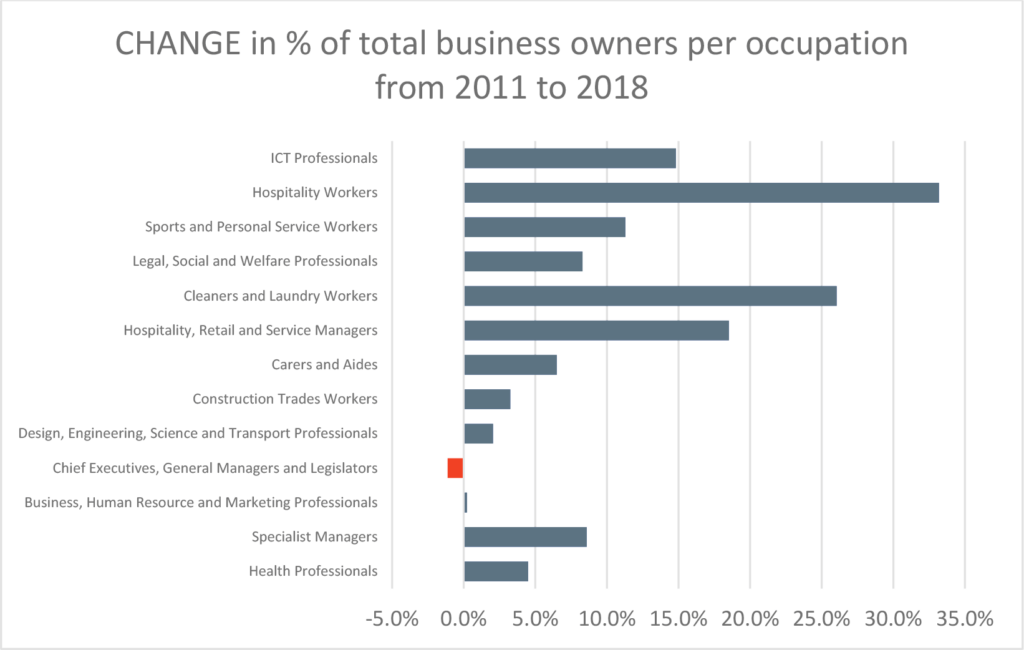
It can be argued that the changing landscape of business owners by occupation is due to the increasing ease of starting and running a business (compared to 10 years ago). With online financial tools, streamlined reporting, electronic payroll, and plentiful productivity applications available, businesses are gradually being run more by owners who are experts in their field, not necessarily, experts in business.
Thus, the rise in demand for the business expert.
The demand for the business expert
In addition to the number of management consultants increasing in Australia, the ANSC has forecast the number of employees working in Management and Related Consulting Services is also set to increase by 14.2% over the next five years. This is close to double the forecast 5yr growth rate of all industries in Australia at 7.8%.
So, what are business owners looking for?
Whilst many industry specialist business owners have an extraordinary grasp on their occupation, many are seeking support of consultants to optimise their business. Our research highlights the three key areas business owners are looking for in business consultants:
- Focused Experts
The large benefit for small-medium businesses is consultants allow them to have a range of experts on hand, without having to employ full-time manager/s. The Management Consulting industry is aware of this, and one study stated that “95% of consultants know pretty well that ‘saying yes’ to everything is not the best way to become proud of their work.”[ii] Hiring a consultant with a focus/specialisation means business owners get focused advice to address their specific issues such as productivity, strategy, marketing or sales. - Digital adoption and transformation support
“The irony for the firms is the COVID-19 pandemic has actually led to “technology acceleration” across Australian businesses.”[iii]
The rapidly changing digital landscape has been a large driver of consultant growth; as well as general job growth within organisations. The ANSC forecasts that in the next 5 years, the largest occupation growth will come from ICT Support and Test Engineers, Computer Network Professionals, Software and Applications Programmers and ICT Business and Systems Analysts.[iv] It is forecast that Small business owners will leverage consultant skills rather than hire IT experts as employees. - Business ‘Coaches’
Australia is slowly adopting the global trend of business coaches. These experts are typically more focused on supporting business owners via a holistic approach to business management. This includes developing strategies for improved work life balance and decreasing burnout. With the increase in Australians wanting more work life balance[v], and knowing that 4 in 5 Australians experience burnout[vi], it is predicted that business coaches will become increasingly more common over the next few years.
The future of the consultant
Despite a high demand for business experts and consultants, competition will undoubtedly increase in the industry as more new entrants appear. We predict the following five areas will be key for consultants to succeed in the new playing field:
- Real results: being able to prove that consulting is ‘working’ can be a struggle. Consultants than can turn their advice into measurable metrics and track these metrics will be favoured over those who cannot/do not.
- Data Driven Decision Making: consultants who can leverage data strategically to drive decision making will position their clients to success above their competitors. This includes using a combination of high-quality company data, accurate competitor data and in-depth industry trends to build a 360 degree business environment.
- Focused Experts, not niche consultants: consultants who can rise to become experts in a key area will benefit greatly from the small to medium business market. However, there is the risk of becoming too niche. Consultants will need to ensure they have a general overview of all areas of business to support owners achieve their goals.
- Digital is here to stay: the number of businesses needing support to adapt to new technology will continue to increase. Thus, there is expected to be a large increase in technology specialists over the next 5 years.
- Measuring productivity: across all industries, managers are seeking support on measuring and improving productivity. This has been heightened due to an increased number of employees working from home since 2020. Further, with manufacturing and logistics industries transitioning to Industry 4.0, business owners are seeking to understand the return on their investments. It is forecast there will be an increased number of consultants focused on supporting owners with employee and asset productivity.
Tools such as The Benchmarking Suite can support consultants to measure improvements across KPI’s.
If it goes up, does it have to come down?
With the rise of Management Consultants over the past 10 years, and the forecast rise over the next 5 years, it would seem the trend may be running its course.
However, our prediction is it will continue for some time yet. As it continues to get easier to start and run a business, more businesses will be owned industry experts, and they will need the support of focused business experts.
Therefore, we don’t believe we are at the ‘peak of the curve’, in fact, we believe the rise of the management consultant has just begun.
References
[i] https://www.abs.gov.au/ausstats/abs@.nsf/lookup/by%20subject/2071.0~2016~main%20features~business%20owner%20managers%20across%20australia~23
[ii] https://www.thevisibleauthority.com/blog/10-consulting-trends-for-2021
[iii] https://www.afr.com/companies/professional-services/the-future-of-consulting-shorter-sharper-cheaper-20201015-p565gi
[iv] Note: growth numbers adjusted to reflect impact of COVID Job losses in industries at time of the report in November 2020.
[v] https://thebrag.com/australians-mental-health/
[vi] https://womensagenda.com.au/latest/four-in-five-australians-faced-burnout-in-2020/

